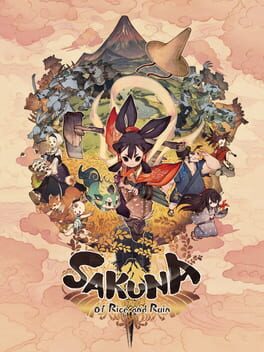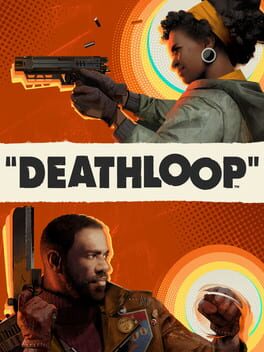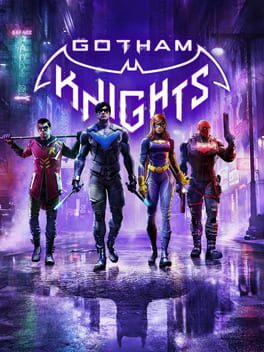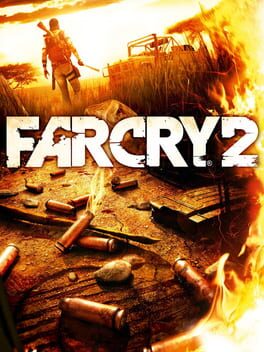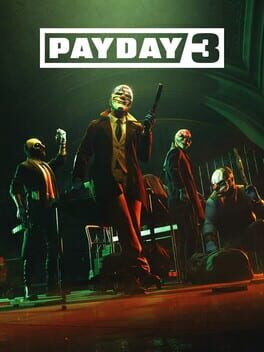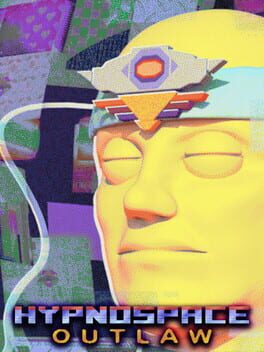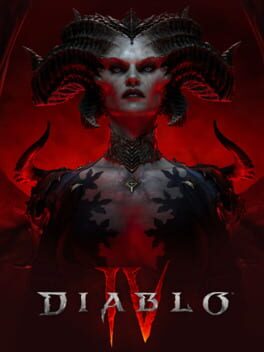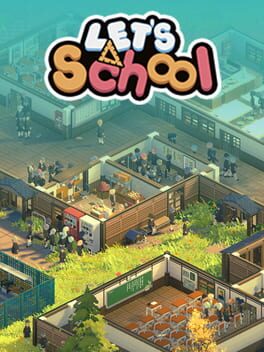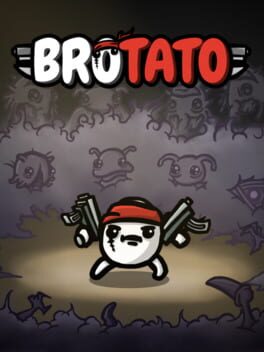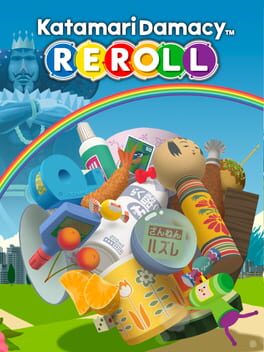jobosno
BACKER
People talking about this game sound like they're fondly reminiscing about clocking in at the steel mill so I guess I now understand that look people give me when they ask what Victoria 3 is
Genuinely can only think about the developers who wasted who knows how much time just to churn out a product that is so fundamentally broken that it's widely declared to be "less playable" than a game old enough to have grandchildren. I can only hope that this works better in Japanese because there's no other reason I can think of to sit on this game for 4 decades and release this as the "new and improved" version. Whole game feels like a teacher of a foreign language class grading me on my ability to converse with a student who's been sleeping through the lessons.
After playing Sakuna, it's hard not to feel like gaming as a whole has missed the mark by reducing every "farming sim" to absent-mindedly picking a tool and left-clicking squares on a grid. I don't hate these games - I have way too many hours in Farm Together - but it's hard to feel like there's any art to it, any appreciation for the discipline. In Sakuna, though, there's so much reverence for and attention to the labor of traditional rice farming that the idea of planting enough seeds to cover the game's single plot of land can feel daunting when you start.
This is why I think it succeeds. It's not that it's got sluggish animations - some of Sakuna's movements in the field are snappy enough that they'd be considered violent if you recreated them in your garden - but the fact that individual steps of the process are given time and attention that most games just skip right past with the plant-water-harvest loop. You till the land by inputting each individual swing of a hoe, you plant seeds one at a time as you tiptoe backwards through the field, you dehull the rice with repeated up-down movements on the analog stick. Your rice will only be evaluated as a batch at the end of the season, but the process instills in you an appreciation for each seed as its own plant. It's not hard to see the laborious, quasi-spiritual exercise of caring for the rice mirrored in the diligence and effort it takes to become a kinder person, to cultivate healthy relationships, to break a bad habit. This journey for Sakuna - the character - is not strictly about farming.
The elephant in the room is the combat, because everyone I've spoken to has agreed that this game's combat is serviceable and not much else. I literally do not care at all about the combat, so I will not speak of it further!
No game out there is in the same hemisphere as Sakuna when it comes to depicting farming as a craft, how the process and its results tie into culture and history and science. If we're lucky enough to see Sakuna inspire a wave of games with similar respect for farming as something that requires diligence and discipline, I suspect it'll be easy to look back at Sakuna and wonder what was so special, because this very much feels like the kind of game that gets eclipsed by its spiritual successors. I wouldn't wish for this game to fade into the background, but if someone can use the foundation Sakuna has laid to climb a little higher, then I welcome it.
This is why I think it succeeds. It's not that it's got sluggish animations - some of Sakuna's movements in the field are snappy enough that they'd be considered violent if you recreated them in your garden - but the fact that individual steps of the process are given time and attention that most games just skip right past with the plant-water-harvest loop. You till the land by inputting each individual swing of a hoe, you plant seeds one at a time as you tiptoe backwards through the field, you dehull the rice with repeated up-down movements on the analog stick. Your rice will only be evaluated as a batch at the end of the season, but the process instills in you an appreciation for each seed as its own plant. It's not hard to see the laborious, quasi-spiritual exercise of caring for the rice mirrored in the diligence and effort it takes to become a kinder person, to cultivate healthy relationships, to break a bad habit. This journey for Sakuna - the character - is not strictly about farming.
The elephant in the room is the combat, because everyone I've spoken to has agreed that this game's combat is serviceable and not much else. I literally do not care at all about the combat, so I will not speak of it further!
No game out there is in the same hemisphere as Sakuna when it comes to depicting farming as a craft, how the process and its results tie into culture and history and science. If we're lucky enough to see Sakuna inspire a wave of games with similar respect for farming as something that requires diligence and discipline, I suspect it'll be easy to look back at Sakuna and wonder what was so special, because this very much feels like the kind of game that gets eclipsed by its spiritual successors. I wouldn't wish for this game to fade into the background, but if someone can use the foundation Sakuna has laid to climb a little higher, then I welcome it.
2021
Arkane has finally managed to make a version of Dishonored where open combat doesn't suck, hooray!
Deathloop is cobbled together from a lot of familiar parts. Throwing bottles, blinking, drop assassinations, a totally-not-supernatural double-jump. Anyone who has played the Dishonored games will find the tools available to the player to be very familiar, and yet playing Deathloop felt different enough from Dishonored that I was able to find it new and thrilling. Part of that is owed to the aesthetic, which is about as textbook 60s retro-future as you can get without completely drowning you in wild technicolor designs a la We Happy Few. But the other part, the more significant part, is that you are completely unable to manually save - a complete inversion from Arkane's other games.
Taken on its own the central concept of Deathloop is intriguing, as playing with time is something that I think is uniquely suited to games, where you get to be the agent of change. Arkane Lyon have already proven to be capable developers when messing with this concept, but Deathloop’s whole-hearted commitment to the idea is where I found real excitement. As you’re only given one day, you will never see anything as dramatic as the years of change from Dishonored 2’s “A Crack in the Slab”, but there are so many more locations and little details here that the end product is still satisfying.
One of the most notable changes if you’re playing this right after the Dishonored games is that this Corvo is named Colt, he has a voice, and he is absolutely not afraid to speak his mind, even if it’s dumb as shit (and it usually is). Colt being one of the few people who can remember earlier loops works fantastically as a game mechanic and as a source of comedy. Bringing it back to manually saving - the complete inability to do so incentivizes just taking risks and hoping you don’t get looped right as you’re trying to do some important shit, but the loop itself means that failure isn’t catastrophic. In fact, abusing this loop and its quirks to gather information in little bite-sized chunks makes revisiting the same levels feel much less tedious than it might sound on paper, as mastering the loop is as much a goal for Colt as it is for you as a player.
Gathering upgrades across loops doesn’t feel like a chore the way it could in Dishonored, and despite most of the powers making their original appearance in a stealth game, getting into firefights can be a lot of fun (and is viable!) - I had a build that let me create a bunch of poison clouds and then blow myself up to ignite them. Nexus - this game’s version of “Domino” - still feels pathetic and useless, but it's entirely possible that I'm too peabrained to use it effectively. There is a real sense of growth as you acquire more upgrades for your powers, and it’s exciting to tear through a level that you know like the back of your hand - up until a player-controlled Julianna tries to place landmines and snipe you in spawn. Yes, this game has an invasion mechanic, and although you can turn off player-controlled invasions (I recommend doing so) it’s still on by default, and as such is one of the game’s prominent weak points.
As you progress through the loop and listen to tens of “are they angry, enjoying this, or... both?” conversations between Julianna and Colt, these little fragmented bits of story, character quirks, and exploitable weaknesses coalesces into a real plot that has real momentum behind it. The game staggers a bit at the end - I won’t spoil anything - with the way it handles this, and it’s the other “big” drawback of this game. I suspect an ending with more playable elements would be more satisfying, but in an immersive sim every additional piece of gameplay adds tens of ways for things to break, so I don’t blame them for keeping things scripted. It’s not even really a let-down - it’s an adequate ending - it just can’t match the hype the previous 20 hours have built up. The mission preceding it (where you acquire enough information from the leads to go through the final loop) also has too much guidance, and I think that it would’ve been an excellent opportunity for the player to demonstrate their knowledge and mastery of the levels and nudge everything into place one last time. All the information is already in the journal so players who take a break from the game can still consult it for reminders, meaning there’s not really a reason for it to be so hand-holdy this far in. Again, this complaint is fairly minor and doesn’t affect my enjoyment of the game in any huge way.
Taken as an entire experience, Deathloop is one of my favorite games this year, and barring some completely bonkers release in the next few months (it’s possible) I suspect this will be my GOTY. It is so far up my alley that it’s scaling the wall at the far end: an imsim where being loud doesn’t feel like a sin, where the characters are as fun as the gameplay, and where you will never have to quicksave.
Deathloop is cobbled together from a lot of familiar parts. Throwing bottles, blinking, drop assassinations, a totally-not-supernatural double-jump. Anyone who has played the Dishonored games will find the tools available to the player to be very familiar, and yet playing Deathloop felt different enough from Dishonored that I was able to find it new and thrilling. Part of that is owed to the aesthetic, which is about as textbook 60s retro-future as you can get without completely drowning you in wild technicolor designs a la We Happy Few. But the other part, the more significant part, is that you are completely unable to manually save - a complete inversion from Arkane's other games.
Taken on its own the central concept of Deathloop is intriguing, as playing with time is something that I think is uniquely suited to games, where you get to be the agent of change. Arkane Lyon have already proven to be capable developers when messing with this concept, but Deathloop’s whole-hearted commitment to the idea is where I found real excitement. As you’re only given one day, you will never see anything as dramatic as the years of change from Dishonored 2’s “A Crack in the Slab”, but there are so many more locations and little details here that the end product is still satisfying.
One of the most notable changes if you’re playing this right after the Dishonored games is that this Corvo is named Colt, he has a voice, and he is absolutely not afraid to speak his mind, even if it’s dumb as shit (and it usually is). Colt being one of the few people who can remember earlier loops works fantastically as a game mechanic and as a source of comedy. Bringing it back to manually saving - the complete inability to do so incentivizes just taking risks and hoping you don’t get looped right as you’re trying to do some important shit, but the loop itself means that failure isn’t catastrophic. In fact, abusing this loop and its quirks to gather information in little bite-sized chunks makes revisiting the same levels feel much less tedious than it might sound on paper, as mastering the loop is as much a goal for Colt as it is for you as a player.
Gathering upgrades across loops doesn’t feel like a chore the way it could in Dishonored, and despite most of the powers making their original appearance in a stealth game, getting into firefights can be a lot of fun (and is viable!) - I had a build that let me create a bunch of poison clouds and then blow myself up to ignite them. Nexus - this game’s version of “Domino” - still feels pathetic and useless, but it's entirely possible that I'm too peabrained to use it effectively. There is a real sense of growth as you acquire more upgrades for your powers, and it’s exciting to tear through a level that you know like the back of your hand - up until a player-controlled Julianna tries to place landmines and snipe you in spawn. Yes, this game has an invasion mechanic, and although you can turn off player-controlled invasions (I recommend doing so) it’s still on by default, and as such is one of the game’s prominent weak points.
As you progress through the loop and listen to tens of “are they angry, enjoying this, or... both?” conversations between Julianna and Colt, these little fragmented bits of story, character quirks, and exploitable weaknesses coalesces into a real plot that has real momentum behind it. The game staggers a bit at the end - I won’t spoil anything - with the way it handles this, and it’s the other “big” drawback of this game. I suspect an ending with more playable elements would be more satisfying, but in an immersive sim every additional piece of gameplay adds tens of ways for things to break, so I don’t blame them for keeping things scripted. It’s not even really a let-down - it’s an adequate ending - it just can’t match the hype the previous 20 hours have built up. The mission preceding it (where you acquire enough information from the leads to go through the final loop) also has too much guidance, and I think that it would’ve been an excellent opportunity for the player to demonstrate their knowledge and mastery of the levels and nudge everything into place one last time. All the information is already in the journal so players who take a break from the game can still consult it for reminders, meaning there’s not really a reason for it to be so hand-holdy this far in. Again, this complaint is fairly minor and doesn’t affect my enjoyment of the game in any huge way.
Taken as an entire experience, Deathloop is one of my favorite games this year, and barring some completely bonkers release in the next few months (it’s possible) I suspect this will be my GOTY. It is so far up my alley that it’s scaling the wall at the far end: an imsim where being loud doesn’t feel like a sin, where the characters are as fun as the gameplay, and where you will never have to quicksave.
2022
Everything about this feels stiff - the writing (sometimes), the on-foot traversal, the driving, the combat, all of it. The combat lacks the impact and fluidity of the Arkham system, which was sitting right there in the same IP, ripe for the taking. The Batcycle travels at a light jog, which is somehow too much for the game to handle. There's room for progression to make a game like this interesting, given that you have 4 different characters to upgrade in parallel, but they managed to kill off any interesting decisions by using a live service-style progression model... without it being a live service?
What the fuck is going on with this game? Enemy levels, gear rarity, stats, upgrade materials, skins, it feels like a game where they added all this and either forgot to monetize it or decided not to in late development. I'm not really sure that even DC superfans would like this one, unless you're chomping at the bit to put Robin in a suit with more greebles on it, or play something that has literally any Red Hood in it.
What the fuck is going on with this game? Enemy levels, gear rarity, stats, upgrade materials, skins, it feels like a game where they added all this and either forgot to monetize it or decided not to in late development. I'm not really sure that even DC superfans would like this one, unless you're chomping at the bit to put Robin in a suit with more greebles on it, or play something that has literally any Red Hood in it.
2008
When I first played Far Cry 2 in 2012 I was so drawn in that I played for thirteen hours straight and forgot to eat. I launched it for the very first time just before noon one day and finished just after midnight.
It would take me until late 2018 to find a game that was capable of doing something similar but this game still holds a special place in my heart. While later entries have an undeniable edge when it comes to polish and having a more fleshed-out open world, I don't think someone would find it as special if their intro to the series was one of those games. FC2 is more unforgiving than subsequent entries and takes its story more seriously.
It would take me until late 2018 to find a game that was capable of doing something similar but this game still holds a special place in my heart. While later entries have an undeniable edge when it comes to polish and having a more fleshed-out open world, I don't think someone would find it as special if their intro to the series was one of those games. FC2 is more unforgiving than subsequent entries and takes its story more seriously.
2023
An improvement over previous Payday games in most aspects, but it wouldn't be an Overkill game without some baffling missteps. That the game exists in a "real engine" should presumably receive partial credit for obvious improvements to moving and shooting, but the developers themselves deserve the rest (obviously): They have clearly been paying attention to how missions are played and received during Payday 2's ten-year lifespan and used that knowledge to craft 8 heists that are - any way you slice them - more interesting than Payday 2's base game offerings. They're further enhanced by changes to stealth that make it feel like a worthwhile approach in its own right instead of a shortcut you take to level up without playing the game. All of this forms a solid base for future growth, and it does need some future growth: Overkill have been a bit too aggressive when it comes to trimming features from their last game and seem to have thrown some important QOL features out with the bathwater.
Pre-game lobby chat is non-existent, which can be pretty important for coordinating strategies and loadouts. Similarly important for team play are ammo indicators for your teammates - I don't even need exact numbers (Deep Rock has it figured out), but I'd like to drop an ammo bag at the right time without relying on my teammates to ask. These are the most obvious ones, but problems like this start to pop up everywhere as you start looking for information you would have if you fired up Payday 2 right now. I say "right now" because they've made these mistakes before: Payday 2 had serious information issues at launch, especially when it came to knowing how much a skill increases a value and for what duration. Making these numbers visible in Payday 3 is a complete layup when it comes to balancing development effort with player appreciation, given that any long-time PD2 player can probably name 2 or 3 major HUD mods (even if they didn't use them!) dedicated to slathering the screen in even more hideous timers.
It needs work, but it's a decent game. I'll admit that I came into this one fully expecting to love it so it should be little surprise that I do, but I think that the most dated parts of Payday 2 (wonky gameplay systems and some uninspired mission design) have seen the greatest glow-up and I think the differences will be obvious and greatly appreciated by the vast majority of people who are coming from the old games.
Pre-game lobby chat is non-existent, which can be pretty important for coordinating strategies and loadouts. Similarly important for team play are ammo indicators for your teammates - I don't even need exact numbers (Deep Rock has it figured out), but I'd like to drop an ammo bag at the right time without relying on my teammates to ask. These are the most obvious ones, but problems like this start to pop up everywhere as you start looking for information you would have if you fired up Payday 2 right now. I say "right now" because they've made these mistakes before: Payday 2 had serious information issues at launch, especially when it came to knowing how much a skill increases a value and for what duration. Making these numbers visible in Payday 3 is a complete layup when it comes to balancing development effort with player appreciation, given that any long-time PD2 player can probably name 2 or 3 major HUD mods (even if they didn't use them!) dedicated to slathering the screen in even more hideous timers.
It needs work, but it's a decent game. I'll admit that I came into this one fully expecting to love it so it should be little surprise that I do, but I think that the most dated parts of Payday 2 (wonky gameplay systems and some uninspired mission design) have seen the greatest glow-up and I think the differences will be obvious and greatly appreciated by the vast majority of people who are coming from the old games.
2022
I have spent many years trying to find an Ip Man simulator. I don't want a game where you go on the offensive. I want the game where trouble comes to me. I am going to sit there, one hundred dudes will do their best to punch me, they will fail, and I will make them all look silly in the process. I don't want some two-button auto-fighting combat system, I want to feel like I'm doing something.
Sifu mostly delivers! I played Absolver, I played the Arkham games, I played Sleeping Dogs, I played Overgrowth, I played Yakuza. Sifu's probably the closest it comes to being Donnie Yen. So it probably makes sense that at any point during Sifu, I probably would tell you that I'm having a fucking blast in that moment. But! I want a little more. I want more game, of course, but what I really mean is that I feel like a lot of Sifu is either undercooked or underutilized.
There are some cool scenes! If you've heard anything about the game, you've heard about the Oldboy hallway. The museum is probably my favorite area in the game between the big ink pendulum thing and the way it plays with your vision on the way to the boss. But the environment mostly feels like it's there because they need something that doesn't look like you're running through a level blockout. When they want you to play with the environments it's some of the most fun you'll have with the game - the museum exhibits, all the clutter in the high-rise level, the parts of the nightclub where you're allowed to interact with objects. The game really wants you to only use weapons when they deem fit though, judging by the barren combat corridors that exist all throughout the game. Some of these encounters would be a little more interesting if I could be more inventive with how I use my environment outside of a couple rooms.
Weapons are a little weird and I wish they found a better balance with them? They can be fun when the enemies pose a threat and you're actually forced to use them wisely, but I only really feel like these are used to full effect against bosses - catching kunai that a boss is throwing at you and airmailing it back to its original sender is as satisfying as an entire fight all on its own, but more often you are either given one or zero weapons when fighting a boss. Sure, that's fine, design decision, that's cool. But it's weird that it comes immediately after a level where I had a bat in my hand the entire time because almost every enemy in the level had a bat or knife, and I could replace my weapon 4 times over before the first one would've broken.
I also feel like the upgrades are missing something. I probably only used 30% of the upgrades in the game intentionally, and that includes both the statue upgrades and the skill... totem pole? It feels like the developers want to extend a hand to you and offer you the chance to make incremental, permanent progress, but these upgrades feel mostly meaningless. There are a couple moves/combos you can use to cheese your way through a boss but there's no real reason to do so if you want Sifu's combat to retain its charm.
Bosses are Sifu's biggest strength. They feel like this is what the game was meant to be about, which is why it's so weird that there's only five of them. The lead-up to each boss plays with the environment, and four of the five encounters are actual, real skill checks. Each of them will slap the soul out of you if you don't understand the skill they're testing. It's effective teaching, and each boss makes you better at the game overall when you need to go back to previous levels and beat them at a younger age. I do think the game would benefit from having more difficulty options, because the bosses seem to assume that you've played the way I did and only do the bare minimum until the game tests you on a skill - button mashing until the game demands you actually defend, blocking until the game insists that you learn how to dodge, etc. People who mastered these early (or learn quickly) are going to cruise through the game much faster. It really leaves me wishing that there were more bosses that tested you on multiple things at once, or forced you to adapt a bit more. No boss tests your positioning against multiple enemies, none have any real mixups. If any Sifu DLC ever gets released, I hope that it includes some endgame bosses that really, truly test the player who's able to make it to the end.
Lastly, I don't want to undersell the fights against standard, non-boss enemies. The fights against crowds are mostly a joke to begin with - it's what allows that Oldboy reference to actually resemble the movie - but they become a genuine thrill as special enemies are mixed in. Unlike the Arkham games, where special enemies are more of a nuisance than anything ("spam dodge until you get a chance to press The One Button That Kills This Kind of Guy"), special enemies in Sifu feel like a welcome challenge. They apply additional - but not overwhelming - pressure to the player, forcing you to change the way you defend to create new opportunities to attack while still keeping up with the rest of the mob. I enjoy doing the entire museum level all over again (despite having the shortcut) just so I can do the last chunk before the boss where they confine you to a small area while mixing in a bunch of dancers and grapplers.
There's a lot to like here, but I wish the environments and enemies were more alive OR more varied. Its gameplay scratches an itch for me that Absolver never did, being a little bit faster with a lower skill floor (while still making progress towards the skill ceiling feel meaningful and exciting). I really hope Sloclap decides to do more with this system, no matter what form it takes.
Sifu mostly delivers! I played Absolver, I played the Arkham games, I played Sleeping Dogs, I played Overgrowth, I played Yakuza. Sifu's probably the closest it comes to being Donnie Yen. So it probably makes sense that at any point during Sifu, I probably would tell you that I'm having a fucking blast in that moment. But! I want a little more. I want more game, of course, but what I really mean is that I feel like a lot of Sifu is either undercooked or underutilized.
There are some cool scenes! If you've heard anything about the game, you've heard about the Oldboy hallway. The museum is probably my favorite area in the game between the big ink pendulum thing and the way it plays with your vision on the way to the boss. But the environment mostly feels like it's there because they need something that doesn't look like you're running through a level blockout. When they want you to play with the environments it's some of the most fun you'll have with the game - the museum exhibits, all the clutter in the high-rise level, the parts of the nightclub where you're allowed to interact with objects. The game really wants you to only use weapons when they deem fit though, judging by the barren combat corridors that exist all throughout the game. Some of these encounters would be a little more interesting if I could be more inventive with how I use my environment outside of a couple rooms.
Weapons are a little weird and I wish they found a better balance with them? They can be fun when the enemies pose a threat and you're actually forced to use them wisely, but I only really feel like these are used to full effect against bosses - catching kunai that a boss is throwing at you and airmailing it back to its original sender is as satisfying as an entire fight all on its own, but more often you are either given one or zero weapons when fighting a boss. Sure, that's fine, design decision, that's cool. But it's weird that it comes immediately after a level where I had a bat in my hand the entire time because almost every enemy in the level had a bat or knife, and I could replace my weapon 4 times over before the first one would've broken.
I also feel like the upgrades are missing something. I probably only used 30% of the upgrades in the game intentionally, and that includes both the statue upgrades and the skill... totem pole? It feels like the developers want to extend a hand to you and offer you the chance to make incremental, permanent progress, but these upgrades feel mostly meaningless. There are a couple moves/combos you can use to cheese your way through a boss but there's no real reason to do so if you want Sifu's combat to retain its charm.
Bosses are Sifu's biggest strength. They feel like this is what the game was meant to be about, which is why it's so weird that there's only five of them. The lead-up to each boss plays with the environment, and four of the five encounters are actual, real skill checks. Each of them will slap the soul out of you if you don't understand the skill they're testing. It's effective teaching, and each boss makes you better at the game overall when you need to go back to previous levels and beat them at a younger age. I do think the game would benefit from having more difficulty options, because the bosses seem to assume that you've played the way I did and only do the bare minimum until the game tests you on a skill - button mashing until the game demands you actually defend, blocking until the game insists that you learn how to dodge, etc. People who mastered these early (or learn quickly) are going to cruise through the game much faster. It really leaves me wishing that there were more bosses that tested you on multiple things at once, or forced you to adapt a bit more. No boss tests your positioning against multiple enemies, none have any real mixups. If any Sifu DLC ever gets released, I hope that it includes some endgame bosses that really, truly test the player who's able to make it to the end.
Lastly, I don't want to undersell the fights against standard, non-boss enemies. The fights against crowds are mostly a joke to begin with - it's what allows that Oldboy reference to actually resemble the movie - but they become a genuine thrill as special enemies are mixed in. Unlike the Arkham games, where special enemies are more of a nuisance than anything ("spam dodge until you get a chance to press The One Button That Kills This Kind of Guy"), special enemies in Sifu feel like a welcome challenge. They apply additional - but not overwhelming - pressure to the player, forcing you to change the way you defend to create new opportunities to attack while still keeping up with the rest of the mob. I enjoy doing the entire museum level all over again (despite having the shortcut) just so I can do the last chunk before the boss where they confine you to a small area while mixing in a bunch of dancers and grapplers.
There's a lot to like here, but I wish the environments and enemies were more alive OR more varied. Its gameplay scratches an itch for me that Absolver never did, being a little bit faster with a lower skill floor (while still making progress towards the skill ceiling feel meaningful and exciting). I really hope Sloclap decides to do more with this system, no matter what form it takes.
2019
Recommended by lpslucasps on this list.
I've managed to shoot myself in the foot a little bit by promising to "review" anything on the aforementioned list, as this game has proven to be an especially difficult one. I've got a lot on my mind after playing it and I'm going to have to cheat a little bit with the format, because I don't think I can nicely condense this down into a single review with a coherent theme.
- Loads of nostalgic authenticity throughout the experience. I don't think this comes as a surprise to anyone given that it's the most surface-level observation, but it's true. I was born at the right time and raised by a tech-savvy mom, allowing me to witness the end of this era of the internet, even if I was a little young. There are a lot of details here that are so easy to forget in the era of WordPress and Squarespace sites prepared straight out of the can, adhering to good graphic design principles.
- It's a little uncomfortable seeing how little some things have changed. There are still painfully earnest posts from children and teens trying to figure things out, every new technology is still a fight between little Davids trying to unseat massive, corporate Goliaths before they take over the Cool New Thing™. Communities have always had awful shit that moderators are woefully unequipped to handle, on platforms that the creators don't even fully understand...
- ...and it all reminds me of being at work. I work in IT and found myself slipping into work mode a lot here, forced to emotionally detach myself from the cases/tickets I'm working on. I see your very real, very serious harassment case, and I can't do anything to punish them because I don't have the tools. I am powerless, except when it comes to ruining someone's day because a policy they've never read said posting a picture of a cartoon fish is an actionable offense. New fires will always ignite as you're putting out the old ones, and moderators are given this cruel, Sisyphean task of rectifying every possible issue on a platform using extremely limited tools that are hardly suited to the task.
- I feel like a lot of my enjoyment is tethered to my own memory of the ugly, poorly laid-out webpages of old (complete with horrendously compressed gifs, videos, and music). I can't speak to how it'll play for those without the memories - the memories aren't important for knowledge reasons, but for patience reasons. This game is full of tedium, and while I'm not trying to pitch this as some "zoomers will hate this!", I would personally be a little annoyed by it all if it didn't remind me of times where I was younger and dumber. If you get past that (or don't care), there's a lot of love here - love for technology of the past, and love for the people that use it. It's a pretty little digital diorama, and I like what it represents.
- I stand with Gooper
I've managed to shoot myself in the foot a little bit by promising to "review" anything on the aforementioned list, as this game has proven to be an especially difficult one. I've got a lot on my mind after playing it and I'm going to have to cheat a little bit with the format, because I don't think I can nicely condense this down into a single review with a coherent theme.
- Loads of nostalgic authenticity throughout the experience. I don't think this comes as a surprise to anyone given that it's the most surface-level observation, but it's true. I was born at the right time and raised by a tech-savvy mom, allowing me to witness the end of this era of the internet, even if I was a little young. There are a lot of details here that are so easy to forget in the era of WordPress and Squarespace sites prepared straight out of the can, adhering to good graphic design principles.
- It's a little uncomfortable seeing how little some things have changed. There are still painfully earnest posts from children and teens trying to figure things out, every new technology is still a fight between little Davids trying to unseat massive, corporate Goliaths before they take over the Cool New Thing™. Communities have always had awful shit that moderators are woefully unequipped to handle, on platforms that the creators don't even fully understand...
- ...and it all reminds me of being at work. I work in IT and found myself slipping into work mode a lot here, forced to emotionally detach myself from the cases/tickets I'm working on. I see your very real, very serious harassment case, and I can't do anything to punish them because I don't have the tools. I am powerless, except when it comes to ruining someone's day because a policy they've never read said posting a picture of a cartoon fish is an actionable offense. New fires will always ignite as you're putting out the old ones, and moderators are given this cruel, Sisyphean task of rectifying every possible issue on a platform using extremely limited tools that are hardly suited to the task.
- I feel like a lot of my enjoyment is tethered to my own memory of the ugly, poorly laid-out webpages of old (complete with horrendously compressed gifs, videos, and music). I can't speak to how it'll play for those without the memories - the memories aren't important for knowledge reasons, but for patience reasons. This game is full of tedium, and while I'm not trying to pitch this as some "zoomers will hate this!", I would personally be a little annoyed by it all if it didn't remind me of times where I was younger and dumber. If you get past that (or don't care), there's a lot of love here - love for technology of the past, and love for the people that use it. It's a pretty little digital diorama, and I like what it represents.
- I stand with Gooper
2019
This is mostly the kind of game that I've been waiting for for a very long time, a true "walking sim". Instead of using this term derisively for linear, plot-driven games where you hold W and click things, walking is instead given a full set of mechanics and is your main way of interfacing with the game world.
In that regard, this game is a fucking masterpiece. Using your tools and your mind to navigate this world is a treat and seeing those tools benefit others is one of my favorite parts of any game, period. A special mention goes out to the floating carriers, because finding a good spot to plop that bad boy down and turn this into a snowboarding game is always an excellent feeling. Even the combat with other humans is fun, as it's just difficult enough to pose a threat without being oppressive.
Where this game really falls short for me, though, is the story. It is the kind of dense throwaway lore you should probably expect from Kojima, a world that is dead set on breaking your immersion every possible moment by having everyone repeat the themes of the game back to you every time you have the audacity to interact with someone.
Any time the story ties into the gameplay, it begins to cross the line from "encouraging the player to find fun in minutiae" into straight-up tedium. The game attempts to force you to care about BB by taking him away for a couple missions, but I ended up liking those the best by far. The BTs are literally never any fun to interact with, and the fact that they become comically easy to deal with as you upgrade your gadgets doesn't make it any better. Last but certainly not least - putting boss fights in a game like this should be punishable by a substantial prison sentence.
It is an excellent set of gameplay mechanics bogged down by Kojima bullshit. It's really a shame this is the price we have to pay to actually play this game, then, because you can bet your ass that at any other studio this would be some bonkers scrapped idea that would get an employee laughed back into a coffee-fetching role. Despite all the things that make me groan and all the venom I have for the plot, it's one of the most unique games I've ever played wrapped up in a AAA package, and if every 7 out of 10 I've played was like this I'd never have a fucking dime to my name again.
In that regard, this game is a fucking masterpiece. Using your tools and your mind to navigate this world is a treat and seeing those tools benefit others is one of my favorite parts of any game, period. A special mention goes out to the floating carriers, because finding a good spot to plop that bad boy down and turn this into a snowboarding game is always an excellent feeling. Even the combat with other humans is fun, as it's just difficult enough to pose a threat without being oppressive.
Where this game really falls short for me, though, is the story. It is the kind of dense throwaway lore you should probably expect from Kojima, a world that is dead set on breaking your immersion every possible moment by having everyone repeat the themes of the game back to you every time you have the audacity to interact with someone.
Any time the story ties into the gameplay, it begins to cross the line from "encouraging the player to find fun in minutiae" into straight-up tedium. The game attempts to force you to care about BB by taking him away for a couple missions, but I ended up liking those the best by far. The BTs are literally never any fun to interact with, and the fact that they become comically easy to deal with as you upgrade your gadgets doesn't make it any better. Last but certainly not least - putting boss fights in a game like this should be punishable by a substantial prison sentence.
It is an excellent set of gameplay mechanics bogged down by Kojima bullshit. It's really a shame this is the price we have to pay to actually play this game, then, because you can bet your ass that at any other studio this would be some bonkers scrapped idea that would get an employee laughed back into a coffee-fetching role. Despite all the things that make me groan and all the venom I have for the plot, it's one of the most unique games I've ever played wrapped up in a AAA package, and if every 7 out of 10 I've played was like this I'd never have a fucking dime to my name again.
2021
The thing that piques my interest with Idol Manager is that the developers seem to have a genuine interest in painting the idol industry as something that brings joy to a lot of people, but has a number of less glamorous elements to it - the exploitation, the scandals (and non-scandals), the fact that a lot of these idols are still just kids and bullying is a real thing that you will need to address. There is a surprising amount of work that you and your staff will have to do, split between doing things that are financially rewarding and things that you need to maintain the wellbeing of your idols. Given that you as a producer/manager need to touch everything that goes out the door in some form or fashion, you really begin to feel stretched thin as you are increasingly unable to maintain a personal relationship with each one of your idols. This becomes a complaint of mine as it means as your operation grows in scale you will have several things being held up while you personally put the finishing touches on every project, but it also makes for some of the most effective moments in the game when you realize you’ve been lost in handling business, haven’t paid much attention to your idols lately, only to get the pop-up that one of them is having a birthday that she’s spending alone in the break room.
These small moments of drama are obviously intentional or the game wouldn’t bother showing you the specific girls at a birthday party, or who is using the break room (and how) during the course of a normal day. While the focus on the joy the idols bring makes sense and makes moments like the one above more impactful through juxtaposition, there are a few elements of the game that detract from the experience due to a conflict in tone. The scandals are the most notable example of this, often referencing real life incidents - there are events referencing Japanese VTubers saying the N word while playing GTA V, and some events that might be references but are already so ridiculous as an inclusion to this game that I have to wonder why they decided this was appropriate.
Perhaps the most bizarre inclusion to me, though, is the inclusion of a whole visual novel-style dating subplot that you access by flirting with one of your idols (only possible if they’re over 18). The game seems to be of two minds about this, given how often it reminds you that dating an idol is a bad idea for a number of reasons, not the least of which is that you’re their employer. However, there’s still a LOT of writing dedicated to dating an idol (most of which is your employee GF coming up with absurdly profound small talk) up to and including marriage, where the game forces one of you to leave the company and gives you a random Fallout-style slideshow ending that tells you all about life after marriage. If you pursue this route and the idol quits the company instead of you, the game continues on as if nothing happened, save for (hilariously) replacing the enormous “Flirt” button with an enormous button that now reads “You are faithful to your wife”.
It frequently stumbles, but the game is still engaging, and if you’re trying to be successful you’ll always have enough plates spinning at once that it’s hard to find a clear stopping point. While there’s always a lot that needs done and there’s never really a big single moment of triumph, the fun comes from sitting back and realizing that you have successfully turned a handful of recruits into genuine stars, and almost being proud as the ones who have been there the longest decide its time to graduate and move on to better things. There’s not enough at play here to be a proper tycoon game, but as a blend between tycoon games, visual novels, and like… a particularly intense clicker/idle game, it works well enough that I don’t regret spending 20 bucks on it, but I don’t know if I’d go out of my way to recommend it to anyone.
These small moments of drama are obviously intentional or the game wouldn’t bother showing you the specific girls at a birthday party, or who is using the break room (and how) during the course of a normal day. While the focus on the joy the idols bring makes sense and makes moments like the one above more impactful through juxtaposition, there are a few elements of the game that detract from the experience due to a conflict in tone. The scandals are the most notable example of this, often referencing real life incidents - there are events referencing Japanese VTubers saying the N word while playing GTA V, and some events that might be references but are already so ridiculous as an inclusion to this game that I have to wonder why they decided this was appropriate.
Perhaps the most bizarre inclusion to me, though, is the inclusion of a whole visual novel-style dating subplot that you access by flirting with one of your idols (only possible if they’re over 18). The game seems to be of two minds about this, given how often it reminds you that dating an idol is a bad idea for a number of reasons, not the least of which is that you’re their employer. However, there’s still a LOT of writing dedicated to dating an idol (most of which is your employee GF coming up with absurdly profound small talk) up to and including marriage, where the game forces one of you to leave the company and gives you a random Fallout-style slideshow ending that tells you all about life after marriage. If you pursue this route and the idol quits the company instead of you, the game continues on as if nothing happened, save for (hilariously) replacing the enormous “Flirt” button with an enormous button that now reads “You are faithful to your wife”.
It frequently stumbles, but the game is still engaging, and if you’re trying to be successful you’ll always have enough plates spinning at once that it’s hard to find a clear stopping point. While there’s always a lot that needs done and there’s never really a big single moment of triumph, the fun comes from sitting back and realizing that you have successfully turned a handful of recruits into genuine stars, and almost being proud as the ones who have been there the longest decide its time to graduate and move on to better things. There’s not enough at play here to be a proper tycoon game, but as a blend between tycoon games, visual novels, and like… a particularly intense clicker/idle game, it works well enough that I don’t regret spending 20 bucks on it, but I don’t know if I’d go out of my way to recommend it to anyone.
2023
Weirdly, I think sitting through a nearly 90-minute-long debate between my coworkers about whether or not Diablo 4's dash is "lazy design" has helped me clarify my thoughts on this whole affair. I'll be comparing it to Diablo 3 a lot because that's the entry that's most clear in my mind.
I think it's an improvement over 3 in most ways. I can understand that someone might be a little put off by the shift away from the third entry's maximalism, where player health could be in the millions within an hour and landing crits for billions of damage within 5-10 hours. I suppose my level 52 rogue with 1300 health in D4 might be a little underwhelming in comparison, but the gameplay effect is the same - I run up to a pack of enemies, build up stacks using one ability and turn them into a smoothie by casting a second one.
It's generally a little more accessible and a little less frustrating, though. The aforementioned dash debate was on the subject of the new, universal mobility skill: every class can press a button to do a short-range dash, and if they want more mobility they can use a skill slot to pick up a class-specific ability. It allows for more interesting builds, more interesting enemies, and even some puzzles designed around this new button. Nothing to encourage over-reliance, of course - you're not going to be using this very often - but it's certainly nice to have. You stock multiple charges of health potions instead of having just one with a cooldown, you can actually upgrade stuff at the blacksmith, and nicest of all? All those weird shopkeeper functions in D3 that required you to burn some rare resource (upgrading gems, re-rolling gear properties) just cost gold. That's it!
The best changes to the gameplay, though, come from a couple key changes.
The first is the shift away from assembling sets of gear. In Diablo 3, picking a build mostly meant finding an ability that you could buff to comical levels by wearing one or two sets of equipment. It really limited what you could do, and it meant that improving your gear took the form of upgrading gems or finding copies of the same set with better secondary stats. D4 doesn't have any gear sets. Builds are dependent on the skills you take, the ways you choose to enhance them, and then, once you've done all that, you go and you find a legendary item and you throw it in the fucking trash. Okay, that's not technically true. You take it to a vendor who rips the legendary property from the item and allows you to apply it to a different piece of equipment. I love this system. I never would've assumed I'd play a new Diablo game where the loot actually feels meaningful, where I'm encouraged to look at items below the highest tier of rarity, where I only have to upgrade gems 2-3 times.
The skill tree: Diablo 3's system of assembling complementary skills and passives wasn't bad for veteran players, but even then, it was pretty difficult to visualize the opportunity cost of picking one enhancement over another. Now, skills are broken down into clearly defined groups, and everything from a group (plus all their enhancements) is visible on one screen at the same time. Uh oh, you've just picked a passive that applies to all your "imbuement" abilities, those are scattered ALL across the tree! Mouse over each ability at the bottom of your screen and you'll see that each one is clearly tagged with a couple properties that will make it obvious which buffs apply to which abilities.
As for the player's stats, my rogue has a lot of gear with buffs to intelligence on it. If you told me this in Diablo 3 I would ask how you even managed to do that, then I would assume that fate has played a cruel joke on you. In Diablo 3 you ignored every single stat that wasn't your class' favorite and had a loot system that did most of the work for you - nearly all the gear you would get would favor your class and buff that stat. D4 doesn't do this. You'll still get gear your class can actually wear, but that gear can have any kind of attribute on it, and those stats will always provide some kind of benefit to you. Intelligence isn't optimal on a rogue, but it's not the end of the world because INT gives rogues extra crit chance. This is shuffled around for each class to remain useful, but you don't have to memorize any of this because you can immediately check what applies to you when you open your inventory.
While a lot of the decisions that directly affect moment-to-moment gameplay have been clarified, the game's biggest weaknesses are still issues with information and transparency. I have been asked several times what a "murmuring obol" is. I don't know how to explain the difference between normal dungeons, Whispers, and the Helltide stuff. The current endgame content is confusing, and while it's explained through a pop-up, all of this still feels obtuse when you're tasked with deciding what you should do next after you've finished the story. You could watch a YouTuber explain how paragon levels work this time around, but you shouldn't have to do that, and best of all: my friends who do watch these videos still find it confusing! It's weird, too, because some of the better selling points of the game - e.g. co-op scaling allowing players of any level to play together - are completely reliant on information sources outside of the game itself. The oft-derided battle pass isn't out yet, but that's what makes me fear for everything I've mentioned in this section. Information issues matter less when you know the game like the back of your hand, which is to say that a profit-focused approach to this game will cater more to the Forever Players who pump endless money into this game than the people trying the series for the first time, the people trying to show something they love to a friend, the people most affected by a lack of clarity.
I think it's an improvement over 3 in most ways. I can understand that someone might be a little put off by the shift away from the third entry's maximalism, where player health could be in the millions within an hour and landing crits for billions of damage within 5-10 hours. I suppose my level 52 rogue with 1300 health in D4 might be a little underwhelming in comparison, but the gameplay effect is the same - I run up to a pack of enemies, build up stacks using one ability and turn them into a smoothie by casting a second one.
It's generally a little more accessible and a little less frustrating, though. The aforementioned dash debate was on the subject of the new, universal mobility skill: every class can press a button to do a short-range dash, and if they want more mobility they can use a skill slot to pick up a class-specific ability. It allows for more interesting builds, more interesting enemies, and even some puzzles designed around this new button. Nothing to encourage over-reliance, of course - you're not going to be using this very often - but it's certainly nice to have. You stock multiple charges of health potions instead of having just one with a cooldown, you can actually upgrade stuff at the blacksmith, and nicest of all? All those weird shopkeeper functions in D3 that required you to burn some rare resource (upgrading gems, re-rolling gear properties) just cost gold. That's it!
The best changes to the gameplay, though, come from a couple key changes.
The first is the shift away from assembling sets of gear. In Diablo 3, picking a build mostly meant finding an ability that you could buff to comical levels by wearing one or two sets of equipment. It really limited what you could do, and it meant that improving your gear took the form of upgrading gems or finding copies of the same set with better secondary stats. D4 doesn't have any gear sets. Builds are dependent on the skills you take, the ways you choose to enhance them, and then, once you've done all that, you go and you find a legendary item and you throw it in the fucking trash. Okay, that's not technically true. You take it to a vendor who rips the legendary property from the item and allows you to apply it to a different piece of equipment. I love this system. I never would've assumed I'd play a new Diablo game where the loot actually feels meaningful, where I'm encouraged to look at items below the highest tier of rarity, where I only have to upgrade gems 2-3 times.
The skill tree: Diablo 3's system of assembling complementary skills and passives wasn't bad for veteran players, but even then, it was pretty difficult to visualize the opportunity cost of picking one enhancement over another. Now, skills are broken down into clearly defined groups, and everything from a group (plus all their enhancements) is visible on one screen at the same time. Uh oh, you've just picked a passive that applies to all your "imbuement" abilities, those are scattered ALL across the tree! Mouse over each ability at the bottom of your screen and you'll see that each one is clearly tagged with a couple properties that will make it obvious which buffs apply to which abilities.
As for the player's stats, my rogue has a lot of gear with buffs to intelligence on it. If you told me this in Diablo 3 I would ask how you even managed to do that, then I would assume that fate has played a cruel joke on you. In Diablo 3 you ignored every single stat that wasn't your class' favorite and had a loot system that did most of the work for you - nearly all the gear you would get would favor your class and buff that stat. D4 doesn't do this. You'll still get gear your class can actually wear, but that gear can have any kind of attribute on it, and those stats will always provide some kind of benefit to you. Intelligence isn't optimal on a rogue, but it's not the end of the world because INT gives rogues extra crit chance. This is shuffled around for each class to remain useful, but you don't have to memorize any of this because you can immediately check what applies to you when you open your inventory.
While a lot of the decisions that directly affect moment-to-moment gameplay have been clarified, the game's biggest weaknesses are still issues with information and transparency. I have been asked several times what a "murmuring obol" is. I don't know how to explain the difference between normal dungeons, Whispers, and the Helltide stuff. The current endgame content is confusing, and while it's explained through a pop-up, all of this still feels obtuse when you're tasked with deciding what you should do next after you've finished the story. You could watch a YouTuber explain how paragon levels work this time around, but you shouldn't have to do that, and best of all: my friends who do watch these videos still find it confusing! It's weird, too, because some of the better selling points of the game - e.g. co-op scaling allowing players of any level to play together - are completely reliant on information sources outside of the game itself. The oft-derided battle pass isn't out yet, but that's what makes me fear for everything I've mentioned in this section. Information issues matter less when you know the game like the back of your hand, which is to say that a profit-focused approach to this game will cater more to the Forever Players who pump endless money into this game than the people trying the series for the first time, the people trying to show something they love to a friend, the people most affected by a lack of clarity.
2023
Short version: If you adopt a stray cat it'll come and sit on the headmaster's desk.
Long version:
This game is not unique in having the player create a character, it is not unique in letting them click on students and read their thoughts, it is not unique in asking you to balance said students' happiness and their grades and the school's budget.
What makes Let's School unique is that its elements come together to create a traditional management sim that frequently has the texture of a life sim, working off its systems in place of a script - a game in which you'll hand-craft a curriculum for each class, period by period, and then sit back and watch as your students go cloudgazing at recess, develop crushes and try to sneak video games into the classroom - apologies to Janet Lewis, who has had her GBA personally confiscated by me on four separate occasions. I am simply too powerful, and you are not.
In playing the game it's easy to see that its developers have genuine admiration for a child's earnestness and enthusiasm, as the game is chock-full of little things for the kids and faculty to do that make your school feel lived-in. These are undoubtedly nice features that add flavor to the game, but more importantly they turn the consequences of any managerial decisions into something more real than just lines on a spreadsheet and a stick figure with a frowny face above their head. In theory, this shouldn't be too uncommon for the genre. In practice, though, Let's School ends up way at the top of the pack by leaning wholeheartedly into its theme. It is unmistakably a game about being the headmaster of a school, about crafting organizational charts, arranging field trips, training staff, balancing budgets, and building a facility that (hopefully) ensures your students are cared-for and comfortable enough to be kids instead of little machines that pay tuition and fill out Scantrons. Perhaps talking about things this way makes me sound like a blowhard, but I emphasize the illusion of NPC interiority because this is the game, this is why you buy Let's School over something like Two Point Campus. Its specialty lies in building your attachment to those kids to the point where - when it comes time to start spending that tuition money - you stop thinking about that "Satisfaction" value like a min-maxer and start thinking like a teacher.
----
Please stop bringing frogs into the classroom.
Long version:
This game is not unique in having the player create a character, it is not unique in letting them click on students and read their thoughts, it is not unique in asking you to balance said students' happiness and their grades and the school's budget.
What makes Let's School unique is that its elements come together to create a traditional management sim that frequently has the texture of a life sim, working off its systems in place of a script - a game in which you'll hand-craft a curriculum for each class, period by period, and then sit back and watch as your students go cloudgazing at recess, develop crushes and try to sneak video games into the classroom - apologies to Janet Lewis, who has had her GBA personally confiscated by me on four separate occasions. I am simply too powerful, and you are not.
In playing the game it's easy to see that its developers have genuine admiration for a child's earnestness and enthusiasm, as the game is chock-full of little things for the kids and faculty to do that make your school feel lived-in. These are undoubtedly nice features that add flavor to the game, but more importantly they turn the consequences of any managerial decisions into something more real than just lines on a spreadsheet and a stick figure with a frowny face above their head. In theory, this shouldn't be too uncommon for the genre. In practice, though, Let's School ends up way at the top of the pack by leaning wholeheartedly into its theme. It is unmistakably a game about being the headmaster of a school, about crafting organizational charts, arranging field trips, training staff, balancing budgets, and building a facility that (hopefully) ensures your students are cared-for and comfortable enough to be kids instead of little machines that pay tuition and fill out Scantrons. Perhaps talking about things this way makes me sound like a blowhard, but I emphasize the illusion of NPC interiority because this is the game, this is why you buy Let's School over something like Two Point Campus. Its specialty lies in building your attachment to those kids to the point where - when it comes time to start spending that tuition money - you stop thinking about that "Satisfaction" value like a min-maxer and start thinking like a teacher.
----
Please stop bringing frogs into the classroom.
2022
Almost certainly the best these Survivors-style games have to offer right now. It's too familiar to produce any converts from the genre's most ardent haters, but if you're convinced that this genre is so close to producing something really, truly good then this entry might give you some additional hope.
Despite its awful title and repulsive soundfont, it manages to dodge all the big pitfalls that every game in its genre seems to fall victim to, with an art style that preserves readability in its most chaotic moments and a slew of gameplay changes that prevent dominant strategies from emerging. Its huge cast of playable characters is justified in how wildly they differ from one another, and a large pool of available stats means that you can get creative with how you build around characters who can't equip weapons, or who deal damage to enemies when they heal. It's a more creative endeavor than most of its cousins, showing a greater willingness to break with genre convention. Round-based gameplay doesn't feel that different from the 20-30 minute marathon most of these games work with, but it means that the game's pacifist characters aren't sacrificing the ability to grab upgrades mid-run. Its weapon system seems to take inspiration from Teamfight Tactics and other auto-battlers: players receive a small bonus for using weapons from the same category, and multiple copies of the same weapon can be combined into a more powerful version with better stats - meaning that you'll still be evaluating your build after filling that last weapon slot, instead of twiddling your thumbs as you wait for the game to play itself.
If this genre's got anything better at the moment I'd love to hear about it - really - but this is the only game I've found that understands and recreates the core gameplay fantasy of the "original" Vampire Survivors without tripping over its own feet due to overwhelming visuals, meta-progression issues, or strategic stagnation.
Despite its awful title and repulsive soundfont, it manages to dodge all the big pitfalls that every game in its genre seems to fall victim to, with an art style that preserves readability in its most chaotic moments and a slew of gameplay changes that prevent dominant strategies from emerging. Its huge cast of playable characters is justified in how wildly they differ from one another, and a large pool of available stats means that you can get creative with how you build around characters who can't equip weapons, or who deal damage to enemies when they heal. It's a more creative endeavor than most of its cousins, showing a greater willingness to break with genre convention. Round-based gameplay doesn't feel that different from the 20-30 minute marathon most of these games work with, but it means that the game's pacifist characters aren't sacrificing the ability to grab upgrades mid-run. Its weapon system seems to take inspiration from Teamfight Tactics and other auto-battlers: players receive a small bonus for using weapons from the same category, and multiple copies of the same weapon can be combined into a more powerful version with better stats - meaning that you'll still be evaluating your build after filling that last weapon slot, instead of twiddling your thumbs as you wait for the game to play itself.
If this genre's got anything better at the moment I'd love to hear about it - really - but this is the only game I've found that understands and recreates the core gameplay fantasy of the "original" Vampire Survivors without tripping over its own feet due to overwhelming visuals, meta-progression issues, or strategic stagnation.
I see people use words like "childlike joy" a lot, but I don't remember the last time I've seen a game so suited to it before playing the remake of 2004's Katamari Damacy. Katamari Damacy asks that you maneuver an increasingly large ball around a level where smaller objects adhere to the ball - the katamari - until you have enough volume to roll up new objects. It is perfectly tactile: in primarily using the analog sticks, you are not the ball - you are the diminutive prince, forced to settle for merely corralling the momentum of a katamari that is often twice your size before you've picked up even a single object.
It's not a frictionless experience, but Katamari Damacy's developers are judicious in how, when, and how much they attempt to toy with the player. For the most part, they're rooting for you: objects are generally placed with those of a comparable size, allowing you to build up some steam before hitting a conspicuous, illogical wall of bicycles or traffic cones or what-have-you that blocks the path ahead - a gentle, guiding, parent-like hand that asks you to spend a little longer working with what you've already got before picking up some new toys. And boy howdy will you pick up some new toys.
Start with thumbtacks, then move to erasers, then pick up a toothbrush that nearly prevents your katamari from rolling in certain directions. In the span of minutes, cars become as useless as thumbtacks as you pluck buildings from the ground, islands from the ocean, and clean the sky of its clouds. You have completed your goal of making something as big as you possibly can during your time at recess, and how do you feel as you roll around the empty ocean? Satisfied? Bored? Hungry for more? Do you feel a tinge of regret at having undone it all? That last one is me speaking from my own experience, but Katamari Damacy itself does not judge you - it'll make a magnificent star, after all.
It's not a frictionless experience, but Katamari Damacy's developers are judicious in how, when, and how much they attempt to toy with the player. For the most part, they're rooting for you: objects are generally placed with those of a comparable size, allowing you to build up some steam before hitting a conspicuous, illogical wall of bicycles or traffic cones or what-have-you that blocks the path ahead - a gentle, guiding, parent-like hand that asks you to spend a little longer working with what you've already got before picking up some new toys. And boy howdy will you pick up some new toys.
Start with thumbtacks, then move to erasers, then pick up a toothbrush that nearly prevents your katamari from rolling in certain directions. In the span of minutes, cars become as useless as thumbtacks as you pluck buildings from the ground, islands from the ocean, and clean the sky of its clouds. You have completed your goal of making something as big as you possibly can during your time at recess, and how do you feel as you roll around the empty ocean? Satisfied? Bored? Hungry for more? Do you feel a tinge of regret at having undone it all? That last one is me speaking from my own experience, but Katamari Damacy itself does not judge you - it'll make a magnificent star, after all.


